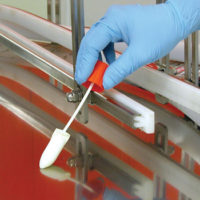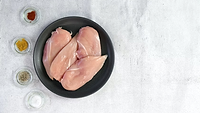In-Field Rapid Test Detects Fecal Contamination of Produce with Near-Total Accuracy

Image credit: Tim Mossholder via Unsplash
Researchers from Purdue University have developed a new biosensor-based rapid test that can detect fecal contamination of produce in-field with 90–100 percent accuracy.
The solution leverages technology that has also been used for bovine respiratory disease and COVID-19 tests, called loop-mediated isothermal amplification (LAMP). The new, paper-based biosensor is the first demonstration of a portable LAMP testing platform implemented on a fresh produce farm. The sensor uses fecal indicator Bacteroidales as a risk marker, which is a microbe found in swine, poultry, and cattle excrement.
The assay kit comprises a drop dispenser, paper-based devices, and a heating imager, which growers can use and glean results from entirely in-field. After swabbing a collection flag, the user puts it in a drop dispenser, which is preloaded with liquid to dispense a specific volume. The liquid dispenses into the paper devices that contain the compounds needed to detect DNA in the samples, which are then entered into a heating imager. After one hour in the imager, the test reveals how much Bacteriodales is present.
The levels of Bacteroidales present in a crop field indicates the levels of food safety risk. High levels of contamination would be indicated by 1,000 copies of Bacteroidales DNA per square centimeter (cm2) on a test pad, with one copy corresponding to one cell from any of a broad class of bacteria. Low levels would be ten copies per cm2.
To test the technology, Purdue researchers used it on a commercial lettuce farm in Salinas, California, and in a field next to the Purdue Animal Sciences Research and Education Center in West Lafayette, Indiana. Small, plastic flags were placed throughout the testing area, which were left to collect bioaerosol samples for a week. All of the flags were brought to the laboratory for quantitative polymerase chain reaction (qPCR) analysis to determine the levels of Bacteriodales present.
The field test results were confirmed to be 100 percent accurate by the laboratory tests. However, the field tests lacked samples containing an intermediate range of contamination, which would have yielded most of the mismatches. Still, the assay can detect as few as three copies of Bacteroidales DNA per cm2, and the researchers estimate that tests involving a full range of contamination would achieve agreement with laboratory testing of above 90 percent.
Funding for the project was provided by the Center for Produce Safety, the California Department of Food and Agriculture, and the U.S. Department of Agriculture’s Agricultural Marketing Service. Researcher Mohit Verma, Ph.D., Associate Professor of Agricultural and Biological Engineering at Purdu, disclosed the new innovation to the Purdue Innovates Office of Technology Commercialization, which has applied for a patent to protect the intellectual property. Purdue issued a license for the technology to Verma’s company, Krishi, which is currently raising capital for commercialization.
Looking for a reprint of this article?
From high-res PDFs to custom plaques, order your copy today!






